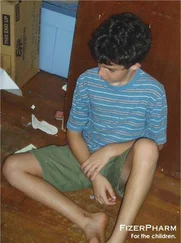At least hers came back now and again — his didn’t darken the door — but they were very scattered and Della, left to herself for long stretches of time, was prone to forgetfulness and thoughts about birch trees and naked boys that she had never known. Sometimes, from next door a scratching or tapping, like, What could he be up to in there? Other times so much silence she wrote it down: ‘16th April — no noise’, trying to keep track of things, in case the man died. Despite the fact that she couldn’t remember what year it was, sometimes, if the truth be told.
She pushed the scraps of paper behind the mantelpiece clock. The noises happened behind this wall, in his kitchen, which was the mirror to hers. Domestic scrapings, and the odd bump or clatter. You might think, as she sometimes did, that he was doing something odd in there, but who would have guessed the real oddness of it; that he could not see what he was doing, at all.
It took her months to realise it. She met him outside the local newsagent’s — it might have been a day in February — and he neglected to salute her. And this put her in mind of the last time he passed, without a nod or a sign. So either he was fighting with her, or there was something else astray. Still, he had always been such an irritating person that the weather turned to spring before her conscience got to her and she finally said, ‘Hello, Tom,’ in a voice so loud it might have been sarcastic.
He started and looked around.
‘Della?’ he said, and she would have thought then that the eyes were going, if it weren’t for the daily paper tucked under his arm. Also, she knew by the way he said her name that he was more intimate with her than she liked, on the other side of their brick wall.
Then, one day in April, she saw the newspapers in a clump for the binmen, and a curious sense about them that woke her up in the middle of the night with the fact that they had not been opened, let alone read, and the man next door, whether he knew it or not, was blind.
There was nothing worse than knowing all this. If it was just his mind that was going then at least he would forget, from one minute to the next, how miserable he was. But the noises behind the wall were not the vague scrabblings of old age. He was looking for something. He was getting it wrong, over and over again. She thought of him in there in the gathering filth and she hadn’t even a phone number to ring. And even if she had — if she looked one of the children up in the book — what would she say? They would be in their fifties by now, Colm and Maureen, with families of their own. They would be older than her doctor, older than most people. Imagine asking them to remember their own father — the shame of it. Imagine being turned down.
She looked up the book anyway and found the son’s name, Colm Delaney. Della had a vision of him at the age of five; such a charmer and bold as brass. Though she felt, even then, that the brass would win out in the end and the charm sour into his father’s, who was always so quick to pass remarks. And she did not lift the phone.
He was a most provoking man, Mr Blink, Mr Blunderbuss, the soft white stick that lived next door. One of the first things he said to her — she was out walking her new baby, they couldn’t have been three weeks in the place; it was the summer of 1950 and there she was with her beautiful first son, pushing him in front of her for all to admire, and he looked into the pram and said, ‘He’s small for an Aberdeen Angus.’ By which she was to take all sorts of implications. Poor Della, the innocent young wife, with a nine-pound baby coming out of her — the fright of it at the time and the whole world turning inside out. He’s small for an Aberdeen Angus. A tone he had that walked into your head and made itself right at home. Laughing at the wreck of her private parts, somehow, or at the size of her husband’s — her husband was off working in Scotland at the time. Laughing at her foolish pride in the baby and, worse than all this, obliging her to laugh, too.
And she would have forgotten it, if it weren’t so much the nature of the man.
‘You’re very dressed up,’ he might say, meeting her in the kitchen over a cup of tea with his wife. Like she was getting above herself. Or his wife was letting herself go. Whatever he meant, he managed to make everyone unhappy, in a radius.
‘Oh, you’d know all about that,’ he’d say, over something innocuous, like buying a pork chop.
‘About what? What!?’ Sometimes she wanted to remind him that he did not actually know her. That anyone could have bought the house next door. Anyone at all could be playing with their baby in the little front garden as he walked by and said, ‘How’s the brat?’ over the wall.
It was midsummer by now and Della was awake at four and asleep again at three in the afternoon, and it was very aggravating to be so out of step with the world, snoring through the Lotto results and waking with the worst kind of film spilling unheeded into the room. She would switch the telly off and in the after-image came the picture of the boys playing on the riverbank. She would try to hold that, and fix the place in her mind. The white forks of their legs; the ease and grace of them as they stood and watched the boy with a stick leaning out over the water. The flatness of the river below.
Della was expecting to die any moment. But it didn’t seem to be happening, somehow — river or no river. Still, this was another reason she put off doing something about the man next door, feeling in a childish sort of way that no one would expect her to help him if she was dead: no one would blame her if she was slumped in a chair while the telly panicked and begged for someone to turn it off, night after night. But she didn’t die. She didn’t even feel dizzy when she stood up out of her chair. All that came to her were the alien tang and the drifting nights of old age, while darkness gathered next door and the scratching and tapping went on. Getting under the skin of his own house: the world’s most irritating man.
‘Where are you off to?’ he’d said to her once. ‘In your good shoes.’
Maybe, she thought all these decades later, he had been talking about sex. And this was what got to her. The nerve of him — thinking she might be interested; horrible person that he was, the kind of man who’d be sarcastic to a dog. But she had left herself open to it: by being pregnant, maybe, by pushing prams, by whatever passed between herself and her husband in the dark. So it was just as much as she deserved (her whimpering, maybe, coming through the wall), he could say what he liked about her shoes, or her pork chops, or the vegetables she bought from the vegetable man. It was enough to drive you demented. She began to feel thought about, and watched. She did not like passing their windows, any more.
She wouldn’t have kept up the connection except that they were neighbours and she felt sorry for his wife, Noreen, who was a terrific person, especially when Della was off in the Coombe. She fed the abandoned children and doted on the new babies, each of them as they came in the door, this woman who was sneered at day and night by a husband who only gave her two.
Though he was mad about her, in his way; couldn’t move without her. And there was a whole year he sat in their front room and nothing was said — about his job, or what was happening, or why he was sitting there in the dark. After which time, his comments never seemed to hit home. They were getting a bit old for all that anyway, Della bagged out by five pregnancies looking in the mirror and seeing her mother looking back: still, she felt, in those years, uncommonly strong, with all her children growing around her. Until the day her little daughter, Margaret, came in crying because Mr Delaney said her chest was getting fat. Such a peculiar and wrong thing for a man to say, and the whole street going, ‘Isn’t he a ticket, ha ha ha.’ She thought it was wrong at the time and she thought so now and, though her own husband said she was silly, hysterical, call it what you like, Della, burning with shame and sorrow for her daughter’s poor breasts, did not address a word to Tom Delaney, or laugh at his jokes, or stop in the street, from that day out. She did not fight him, she just failed to respond, and his wife she spoke to less and less and then not at all. And this was a great loss to her — his wife Noreen, who was always such a terrific person — it cut a small notch out of her. By the time she died, Noreen had no friends left, of course, and that too may have been part of his plan — the spoiler. Della went to the woman’s funeral and wondered if things could have been otherwise, and realised that they could not.
Читать дальше












